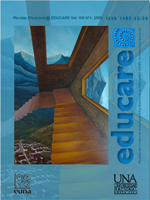Componentes teóricos para la comprensión de la pedagogía intercultural como práctica docente
DOI:
https://doi.org/10.15359/ree.13-1.5Keywords:
interculturalism, human rights, xenophobia, multicultural education, intercultural pedagogy, intercultural challengesAbstract
Nowadays, a topic that arises in the educational domain as an answer to the demands of an increasingly diverse society which also demands processes of inclusion is, without a doubt, the concept of interculturalism. There are several conceptual approaches that are far from creating a pedagogy of interculturalism, specially when interculturalism is valued as a philosophy, which requires the development of a new teacher who is not only capable of recycling him/herself but who is also aware of the paradigmatic changes that interculturalism demands.
The article presents an approach to the theoretical components for the understanding of intercultural pedagogy as an educational practice. It begins with a brief presentation of the current educational system, followed by the interpretation of human rights as a fundamental issue of human diversity, and certain approaches and clarification models for interculturalism in elementary school. Finally, the article briefly discusses some of teacher’s intercultural competencies in the face of such diversity.
References
Aguado, T. (2003). Pedagogía intercultural. Madrid, España: McGraw-Hill.
Besalú, X. (2002). Diversidad cultural y educación. Madrid: Síntesis.
Booth, T. & Ainscow, M. (2000). Índice de Inclusión. Desarrollando el aprendizaje y la participación
en las escuelas. Santiago, Chile: OREALC/UNESCO.
Coordinación Educativa y Cultural Centroamericana (CECC). (2002). La práctica de la
Interculturalidad en el aula. San José, Costa Rica: Autor.
Delors, J. (Coord.). Al Mufti, I., Amagi, I., Carneiro, R., Chung, F., Geremek, B., et al. (1996). La
educación encierra un tesoro. (Informe a la UNESCO de la Comisión Internacional sobre la
educación para el siglo XXI). Madrid, España: Santillana Ediciones UNESCO.
Gabino, J. (2002). Educar y convivir en la cultura global. Madrid, España: Ediciones Morata.
Ianni, O. (1995). Metáforas de la globalización. Revista de Ciencias Sociales, Nº 2, s. pp.
Jimeno Sacristán, J. (2005). La educación aún es posible. Madrid, España: Editorial Morata.
Jordán, J. A. (1994). La escuela multicultural. Un reto para el profesorado. Barcelona, España:
Paidós.
Martínez, A. & Sáenz, J. (1998). Del Racismo a la Interculturalidad. Competencias de la educación.
Madrid,España: Narcea.
Meléndez, M. (2002). Educación para la Diversidad en una sociedad de conocimiento. Manizales,
Colombia: Universidad de Manizales.
Meléndez, M. (2002). Diversidad y equidad: paradigma educativo emergente para la Costa Rica en
vías de Desarrollo. Revista Parlamentaria. Vol. 12, N° 2, 81-96.
Merino, J. & Muñoz, A. (mayo-agosto, 1998). Ejes de debate y propuestas de acción para una pedagogía
intercultural [versión electrónica]. Revista Iberoamericana de Educación, Nº 17, s. p.
Organización de las Naciones Unidas para la Educación. (1998). Informe mundial sobre la
educación. Los docentes y la enseñanza en un mundo en mutación. [on line]. Madrid, España:
UNESCO.
Proyecto Estado de la Nación en desarrollo humano sostenible. (2005). Primer Informe Estado de
la Educación Costarricense. San José, Costa Rica: Autor
Sabariego, M. (2002). La educación Intercultural. Ante los retos del siglo XXI. Vizcaya, España:
Editorial Desclée de Brouwer.
UNESCO. (2 de Nov., 2001). Declaración Mundial de la Diversidad cultural. Recuperado el 25 de
setiembre de 2007, de http://portal.unesco.org/es/ev.php-URL_ID=13179&URL_DO=DO_
TOPIC&URL_SECTION=201.html
Us, P. (2002). La práctica de la Interculturalidad en el aula. San José, Costa Rica: CECC.
Downloads
Published
How to Cite
Issue
Section
License
1. In case the submitted paper is accepted for publication, the author(s) FREELY, COSTLESS, EXCLUSIVELY AND FOR AN INDEFINITE TERM transfer copyrights and patrimonial rights to Universidad Nacional (UNA, Costa Rica). For more details check the Originality Statement and Copyright Transfer Agreement
2. REUTILIZATION RIGHTS: UNA authorizes authors to use, for any purpose (among them selfarchiving or autoarchiving) and to publish in the Internet in any electronic site, the paper´'s final version, both approved and published (post print), as long as it is done with a non commercial purpose, does not generate derivates without previous consentment and recognizes both publisher's name and authorship.
3. The submission and possible publication of the paper in the Educare Electronic Journal is ruled by the Journal’s editorial policies, the institutional rules of Universidad Nacional and the laws of the Republic of Costa Rica. Additionally, any possible difference of opinion or future dispute shall be settled in accordance with the mechanisms of Alternative Dispute Resolution and the Costa Rican Jurisdiction.
4. In all cases, it is understood that the opinions issued are those of the authors and do not necessarily reflect the position and opinion of Educare, CIDE or Universidad Nacional, Costa Rica. It is also understood that, in the exercise of academic freedom, the authors have carried out a rogorous scientific-academic process of research, reflection and argumentation thar lays within the thematic scope of interest of the Journal.
5. The papers published by Educare Electronic Journal use a Creative Commons License:















 The articles published by Educare Electronic Journal can be shared with a Creative Commons License:
The articles published by Educare Electronic Journal can be shared with a Creative Commons License: 



